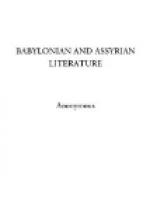[Footnote 35: May this be the Hebrew word for garments, “beged"?]
[Footnote 36: Defaced.]
[Footnote 37: Arunte.]
[Footnote 38: Defaced.]
[Footnote 39: Defaced.]
[Footnote 40: Precisely thus: “The King of Assyria brought men from Babylon ... and placed them in the cities of Samaria instead of the children of Israel.”—2 Kings xvii. 24.]
[Footnote 41: “Akhari.” Heb. [Hebrew: achari].]
[Footnote 42: Literally, Zurai, Sidunai, Gubalai, Makullat.]
[Footnote 43: See p. 192, note 5.]
[Footnote 44: Ebony.]
[Footnote 45: The mountain chain which divides Syria from Cilicia.]
[Footnote 46: Or, proof.]
[Footnote 47: Literally, sat.]
[Footnote 48: I.e., “the sun is my light.”]
[Footnote 49: Assyr. “Airu,” Heb. “Iyar.” 866 B.C.]
[Footnote 50: Literally, Kumukhaya.]
[Footnote 51: Between Carchemish and the Orontes.]
[Footnote 52: Diarbekr, still known by the name of “Kar-Amid.” Rawlinson’s “Herodotus,” l. 466. The name is of frequent occurrence in early Christian writers.]
[Footnote 53: See p. 188, note 2.]
[Footnote 54: Cf. Is. x. 34, “He shall cut down the thickets of the forest with iron”; also Ezek. xxxix. 10.]
[Footnote 55: The inscription is here defaced.]
[Footnote 56: Defaced.]
[Footnote 57: See p. 188, note 2.]
[Footnote 58: The grandfather of Assur-nasir-pal. His reign probably terminated at 889 B.C.]
[Footnote 59: Literally, shepherd. Thus, Isa. xliv. 28, “Cyrus is my shepherd.”]
[Footnote 60: Cf. Ps. xxix. 10, “The Lord (Jhvh) sitteth upon the flood; yea the Lord sitteth King forever.”]
[Footnote 61: This reads like an annexation of a portion of Babylonian territory.]
[Footnote 62: Or upholder, proclaimer of Sin, the moon; of. I. 127.]
[Footnote 63: Assyr. “Nalad.” Cf. the Heb. yalad “born of.”]
[Footnote 64: Precisely thus were the Israelites carried away to Babylon.]
ASSYRIAN SACRED POETRY
TRANSLATED BY H.F. TALBOT, F.R.S.
The following translations are some of those which I published in the “Transactions of the Society of Biblical Archaeology” in order to show that the Assyrians had a firm belief in the immortality of the soul: a fact which was previously unknown.
I have added specimens of their penitential psalms, and some notices of their numerous superstitions, such as the exorcism of evil spirits, the use of magic knots and talismans, the belief in inherited or imputed sins, and in the great degree of holiness which they attributed to the number Seven. In some of these respects we may evidently see how great an influence was exercised on the mind and belief of the Jews by their long residence at Babylon.




